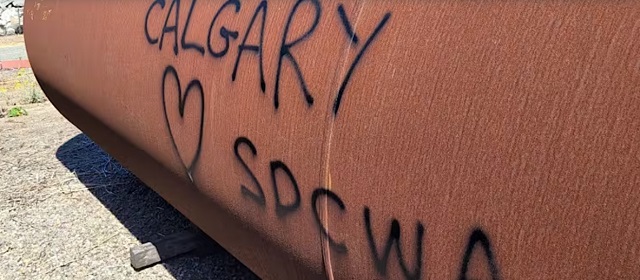Calgary
Behind the Violence, Looting & Vandalism During the Black Lives Matter Riots

Image Credit: Michael Tracey
It has been just over 2 months since the death of George Floyd in the streets of Minneapolis, Minnesota, at the hands of 3 police officers in broad daylight, ignited a global conversation on police brutality. The significant outrage invoked by this tragedy has manifested across the globe in the form of mass protests under the banner of Black Lives Matter. While a significant number of protests have been peaceful presentations of solidarity and collective calls for change, a number of cities throughout the United States and across the world have been devastated by violent riots, vandalism and looting. The response of the media and general public to these instances of violence, which have left a number of people dead, have dramatically deepened the ideological divide surrounding the already controversial issues of systematic racism and police brutality.
One side of the argument is highlighted by an opinion piece written by Robin D. G. Kelley, an American history professor, published in the New York Times titled “What Kind of Society Values Property Over Black Lives?”. This article argues the media’s focus on looting as a part of the riots is a way to deflect from the central issue. “The police keep killing us with impunity,” says Kelley, “Instead, once the burning and looting start, the media often shifts to the futility of “violence” as a legitimate path to justice.”
Similarly, an InStyle piece by Jacqueline Schneider states, “If you’re more concerned about looted storefronts than the brutal loss of life that spurred these protests, please re-evaluate.” The article goes on to highlight certain leading fashion brands, such Marc Jacobs and Coach, have come out in support of the protests despite the material losses sustained by their brands as a result of the looting and destruction. Marc Jacobs published an Instagram post featuring the vandalism of a Los Angeles branch location with the simple caption, “A life cannot be replaced. Black Lives Matter.”
A number of other works with a similar sentiment have emerged over the last two months, many of which make reference to the work of Martin Luther King Jr. While King is largely known for his unwavering commitment to non-violence in the face of oppression, he “recognized violent political rebellions … as the organic response to racial oppression and structural violence” (1).
““Alienated from society and knowing that this society cherishes property above people, [the looter] is shocking it by abusing property rights,” he said. The real provocateur of the riots, he argued, was white supremacy.” (2)
Therefore, many of the arguments that do not denounce looting as a part of the riots lean on this ideological argument along with the notion that the destruction of property should not be discussed alongside the loss of human life.
On the opposite side of this controversial debate, journalist Michael Tracey presents an investigative report featuring first-hand stories from shop owners and locals in small US cities that have received minimal coverage throughout the riots. In something of a post-apocalyptic Purge-esque collection, Michael Tracey’s interviews showcase the current quality of life in places like Atlantic City, Fort Wayne, Green Bay, Olympia and more. The impact of the riots in these areas has been the significant destruction of small businesses and housing projects, burnt buildings and cars, shattered glass and windows barricaded with plywood, oftentimes featuring bullet holes.

Photo Credit: Michael Tracey
According to Tracey, who spent six weeks travelling the US collecting testimonies and documenting the unfolding implications of the ongoing riots, “…The primary victims – meaning those who feared for their safety, suffered severe material losses, and whose lives were upended – are themselves minorities, and were targeted by activist whites.”
Tracey shares the stories, fears and opinions of a number of minority locals and shop owners who struggle to make sense of the looting. Victims of the riots highlight the lack of available emergency responders during the crises, adding to the level of fear and helplessness being experienced. In one video, Tracy interviews a local resident, who “recalls being told during the riots that there would be no fire or police service available and people needed to fend for themselves.”
A number of boarded up storefronts, many of which will likely never open again, feature signage with the phrase “Black-owned business”. Tracey believes this is both a statement of pride as well as a plea to be left alone by rioters, “Does the ubiquity of these types of signs, in which owners declare their ethnic or racial status, seem healthy to you?” he asks.

Photo Credit: Micheal Tracey
These disparate opinions position looting and violent rioting as an inevitable response to minority oppression and injustice, while highlighting the logical inconsistency that occurs as a number of those being victimized are themselves, minorities. While this debate continues to unfold, the chaos remains ongoing across the United States, where many protests have continued to take violent turns and the death toll continues to rise.
For more stories, visit Todayville Calgary.
Alberta
Scotia Place – Calgary unveils design for new arena / events centre

News release from the City of Calgary
Scotia Place, Calgary’s new event centre, designed as a place for community where there is room for everyone
The City of Calgary and Calgary Sports and Entertainment Corporation (CSEC) are excited to reveal the design for Calgary’s new event centre – formally named Scotia Place.
The design is influenced by the ancestral and historical land of Indigenous Peoples and the culturally significant site that embodies our shared purpose – to gather. It brings together Indigenous cultural perspectives with Calgary’s and the region’s natural beauty, reflecting the four elements of nature – fire, ice, land and air.
A striking feature of the building is the central structure with a textured flame motif that emulates a home fire, which is further amplified when it is lit at night. The home fire, a place of warmth and energy that brings people together to share stories of the past and create stories for the future, rises from the white, glacial-like forms that define the lower parts of the building.
“When you consider that Calgary is already the envy of other cities with a new world-class convention centre in the heart of the Culture + Entertainment District, the addition of Scotia Place is another signal to investors that our city understands how to build a future that leverages hospitality and hosting as its core strengths,” says Mayor Jyoti Gondek. “We are also acknowledging and honouring the foundational role that Indigenous communities have played for generations in making Calgary, and now Scotia Place, a space where we all belong.”
Scotia Place, which is scheduled to open in fall 2027, celebrates the area’s importance as a place for all and will be a landmark attraction in Calgary’s emerging Culture + Entertainment District. More than a building, however, the 10-acre city block is designed for community and connection and includes a community rink, outdoor and indoor plazas spaces, four restaurants, the Calgary Flames Team Store, and future development opportunity in the northeast corner. It will provide gathering places and amenities for the 8,000 people who will live in this new downtown neighbourhood.
“Calgary has a long history of hosting world-class events, drawing millions of visitors to the city each year, generating revenue for local businesses, and boosting the economy,” says Danielle Smith, Premier of the Province of Alberta. “With construction on the Calgary Rivers District and Event Centre now underway, Calgary is one step closer to a revitalized downtown that will bring new energy into the city, attract more exciting events, and create jobs to improve the quality of life for Calgarians.”
A development permit application for the facility was submitted on July 19, 2024. This was a significant milestone for the project team, consisting of CAA ICON, HOK-DIALOG, and CANA/Mortenson. People interested in following or commenting on the permit can find the application at Calgary.ca/dmap. The application is expected to be heard by the Calgary Planning Commission by end of 2024.
“This is an important day for Calgary,” says Councillor Sonya Sharp, Event Centre Committee Chair. “Today is about so much more than the designs of a building. Today is the unveiling of a place where Calgarians and visitors from around the world will make memories at concerts, and sport and community events. I hope that everyone is as excited as we are, knowing that Scotia Place will become the complete experience in our new Culture & Entertainment District.”
“At CSEC, a key component of our mission is to be the heartbeat of our community, create connections and bring people together,” said Robert Hayes, CSEC President and CEO. “Scotia Place will become the perfect home to achieve and share this mission with all Calgarians. Seeing the design brings the vision of so many contributors to life. We are especially thankful to the City of Calgary and the Province of Alberta for their leadership and support to help bring us to this point. In stride with our partner Scotiabank, we are very proud to play our role in presenting Scotia Place as the culmination of diligence and passion, that is now visual in this breathtakingly beautiful and meaningful facility.”
“For years we have seen firsthand the value these partnerships bring to the communities in which we operate and for our clients,” said Aris Bogdaneris, Group Head, Canadian Banking of Scotiabank. “Scotia Place introduces a bold new vision for what will be Alberta’s premier sports and entertainment venue. For nearly 20 years, Scotiabank has been a proud partner of Calgary Sports and Entertainment Corporation and together, we are committed to bring fans and our clients an unforgettable experience when they walk through the doors of Scotia Place.”
“We are excited to start the construction of the critical infrastructure needed to build thousands of new homes and to make the Calgary’s new Culture + Entertainment district a reality,” says Devin Dreeshen, Minister of Transportation and Economic Corridors. “Albertans expect basic infrastructure to be maintained and improved and this commitment from the province goes a long way in helping Calgary build these projects.”
Acknowledging the significance of the building’s location at the confluence of the Bow and Elbow Rivers on the ancestral land of the Treaty 7 Peoples and the Metis Nation, The City, CSEC, HOK-DIALOG and CAA ICON worked with an Indigenous Advisory Group that included representatives from the Treaty 7 Nations, the Métis Nation of Alberta, Region 3, and the Urban Indigenous community throughout the design process.
“It was great to be part of a truly representative voice that included all indigenous peoples of southern Alberta regarding the design of this center acknowledging the historic significance of the land it sits on to the Metis people,” said Carmen Lasante Captain of the Calgary Elbow Metis District. “Inclusivity is a core part of who the Metis are. The City has worked hard to include many diverse histories together in creating this space.”
“Engaging in the right way is fundamental to the success of relationship development with the Indigenous communities, as we have played a critical role in the identity of the land now known as the city of Calgary as the Indigenous nations are inextricable linked to the landscape and environment,” says Ira Provost, Piikani Nation Consultation
A key theme heard often during the Indigenous engagement sessions was “Come in, there is room”, making it clear that Scotia Place needs to be a place that is designed for all.
The public plazas are designed to honour the deep-rooted connection that Indigenous Peoples have with the land, incorporating representations of the tipi, Métis Trapper’s Tent, and elements of Alberta’s world-renown natural landscape.
An important design decision was to lower the event and ice surface so that the primary concourse will be at street-level. Calgarians and visitors will be able to move seamlessly between the curb, the primary concourse and the outdoor public plazas.
“We at DIALOG are thrilled to join forces with HOK and combine our unique expertise to transform Calgary’s Event Centre into the catalyst for a dynamic new urban community,” says Doug Cinnamon, Partner Architect at DIALOG.
“Other design principles including public realm activation, the integration of indigenous influences, public art & storytelling, sustainability, and a balance between past, present, and future is central to our vision. The ultimate goal is to ensure seamless accessibility, promote mixed uses, and create vibrant public areas for everyone to enjoy. This joint redesign represents an opportunity to spur investment into the area and enhance its cultural vitality, anchoring Calgary’s position as a thriving, bustling community hub.”
Scotia Place is a generational investment in Calgary’s emerging vibrant Culture + Entertainment District. A modern event centre with universal accessible design throughout and with energy and water conservation built in to maximize efficiencies and the ability to be net-zero by 2050, Scotia place is designed to serve Calgary’s growing community for decades to come.
Construction begins this week. Additional information about Scotia Place including design renderings, a video, and frequently asked questions is available on Calgary.ca/ScotiaPlace.
Alberta
Malign Neglect: What Calgary’s Water-Main Break Reveals about the Failure of City Government
-

 Alberta2 days ago
Alberta2 days agoCentral Alberta MP resigns to give Conservative leader Pierre Poilievre a chance to regain a seat in Parliament
-

 Alberta1 day ago
Alberta1 day agoCalls for a new pipeline to the coast are only getting louder
-

 Daily Caller2 days ago
Daily Caller2 days ago‘Not Held Hostage Anymore’: Economist Explains How America Benefits If Trump Gets Oil And Gas Expansion
-

 Alberta2 days ago
Alberta2 days agoAlberta pro-life group says health officials admit many babies are left to die after failed abortions
-

 Censorship Industrial Complex1 day ago
Censorship Industrial Complex1 day agoJordan Peterson reveals DEI ‘expert’ serving as his ‘re-education coach’ for opposing LGBT agenda
-

 Business1 day ago
Business1 day agoCanada’s economic pain could be a blessing in disguise
-

 Alberta1 day ago
Alberta1 day agoUnified message for Ottawa: Premier Danielle Smith and Premier Scott Moe call for change to federal policies
-

 Education1 day ago
Education1 day agoStudents can’t use AI to cheat on standardized tests



 Mission failure: The rupture of Calgary’s high-pressure water main on June 5 flooded 16th Avenue and threatened the city’s water supply; repairs were halted for a day after two workers were injured, an excess of caution that led to anger and frustration over the city’s basic competence. (Sources of photos: (top)
Mission failure: The rupture of Calgary’s high-pressure water main on June 5 flooded 16th Avenue and threatened the city’s water supply; repairs were halted for a day after two workers were injured, an excess of caution that led to anger and frustration over the city’s basic competence. (Sources of photos: (top)  Built in 1975, the Bearspaw South feeder main draws from the Bearspaw Water Treatment Facility on the Bow River (bottom) and supplies 60 percent of Calgary’s drinking water. (Sources of photos: (top)
Built in 1975, the Bearspaw South feeder main draws from the Bearspaw Water Treatment Facility on the Bow River (bottom) and supplies 60 percent of Calgary’s drinking water. (Sources of photos: (top)  A story full of holes: City officials said the water main had been inspected and tested regularly, and that no leaks had been found; experts pointed out a catastrophic breakage of the line’s multi-layered structure would not likely begin with small leaks – and it emerged the line had not actually been drained and inspected since 2007. (Sources: (left photo)
A story full of holes: City officials said the water main had been inspected and tested regularly, and that no leaks had been found; experts pointed out a catastrophic breakage of the line’s multi-layered structure would not likely begin with small leaks – and it emerged the line had not actually been drained and inspected since 2007. (Sources: (left photo)  Pointing fingers: Calgary mayor Jyoti Gondek blamed Alberta’s UCP government for denying Calgary the money for maintenance and repairs; however, Calgary had never asked for such funding, and in any case received $224 million this year to allocate as it pleased. (Source of screenshot:
Pointing fingers: Calgary mayor Jyoti Gondek blamed Alberta’s UCP government for denying Calgary the money for maintenance and repairs; however, Calgary had never asked for such funding, and in any case received $224 million this year to allocate as it pleased. (Source of screenshot:  Core failures: As in many Western cities, Calgary’s leadership refuses to focus on the basic responsibilities of municipal government, like fixing potholes, clearing snow or ensuring public transit is safe and effective; it prefers building bike lanes people don’t use and planning the next multi-billion-dollar transit line. (Sources of photos (clockwise starting top left):
Core failures: As in many Western cities, Calgary’s leadership refuses to focus on the basic responsibilities of municipal government, like fixing potholes, clearing snow or ensuring public transit is safe and effective; it prefers building bike lanes people don’t use and planning the next multi-billion-dollar transit line. (Sources of photos (clockwise starting top left):  Crisis of competence: Experienced technical specialists, managers and tradesman have been leaving or getting purged from organizations that prioritize conformity to progressive causes like ESG and wokism over the nuts and bolts of keeping systems running. At bottom, engineer James Buker, a retired city waterworks employee. (Source of bottom photo:
Crisis of competence: Experienced technical specialists, managers and tradesman have been leaving or getting purged from organizations that prioritize conformity to progressive causes like ESG and wokism over the nuts and bolts of keeping systems running. At bottom, engineer James Buker, a retired city waterworks employee. (Source of bottom photo:  Hectoring and lecturing: When the state of emergency was declared, local media focussed increasingly citizens’ compliance with water restrictions; the mayor lectured Calgarians on the need to “dig in and do a little bit more”. Shown at bottom, people filling their water jugs at the city’s emergency supply trailer. (Sources of photos: (top)
Hectoring and lecturing: When the state of emergency was declared, local media focussed increasingly citizens’ compliance with water restrictions; the mayor lectured Calgarians on the need to “dig in and do a little bit more”. Shown at bottom, people filling their water jugs at the city’s emergency supply trailer. (Sources of photos: (top)  Water, water everywhere: The clampdown was based on a fear the city would not have enough water to fight a single major fire, this in a city posting daily water surpluses of 100 million litres, with two rivers (including the Bow River shown at top), two large reservoirs (including the Glenmore Reservoir shown at bottom) and multiple small water bodies to draw from.
Water, water everywhere: The clampdown was based on a fear the city would not have enough water to fight a single major fire, this in a city posting daily water surpluses of 100 million litres, with two rivers (including the Bow River shown at top), two large reservoirs (including the Glenmore Reservoir shown at bottom) and multiple small water bodies to draw from. They don’t make ‘em like they used to: The water main break forced the city to rely on the 92-year-old Glenmore Water Treatment Plant (right), built on the north side of the Glenmore Reservoir (left), an engineering marvel of its era.
They don’t make ‘em like they used to: The water main break forced the city to rely on the 92-year-old Glenmore Water Treatment Plant (right), built on the north side of the Glenmore Reservoir (left), an engineering marvel of its era. “Logic clearly dictates that the needs of the many outweigh the needs of the few,” said Star Trek’s Mr. Spock (left); the same progressives who used to nod in agreement to that line seemed more worried about two injured workers than the mission to repair infrastructure critical to 1.6 million Calgarians. Shown at right, a Japanese kamikaze pilot in a damaged single-engine bomber over the U.S. Aircraft Carrier USS Essex, off the Philippine Islands, November 1944. (Source of right photo:
“Logic clearly dictates that the needs of the many outweigh the needs of the few,” said Star Trek’s Mr. Spock (left); the same progressives who used to nod in agreement to that line seemed more worried about two injured workers than the mission to repair infrastructure critical to 1.6 million Calgarians. Shown at right, a Japanese kamikaze pilot in a damaged single-engine bomber over the U.S. Aircraft Carrier USS Essex, off the Philippine Islands, November 1944. (Source of right photo: 



